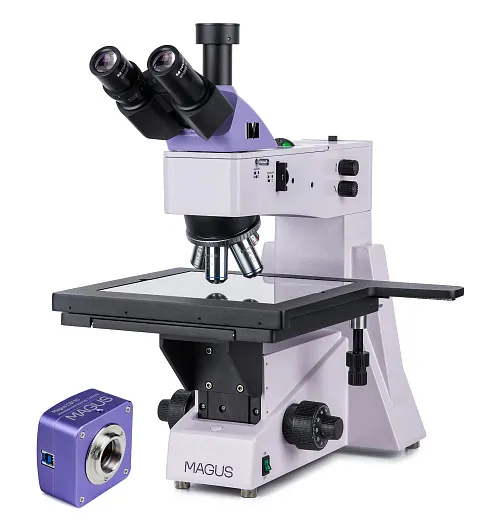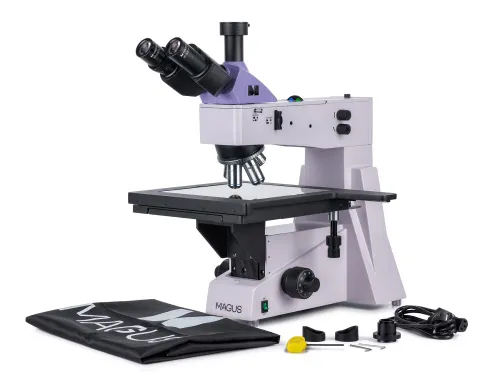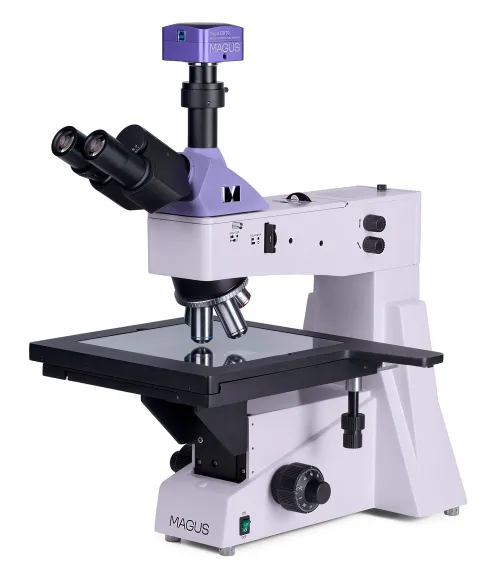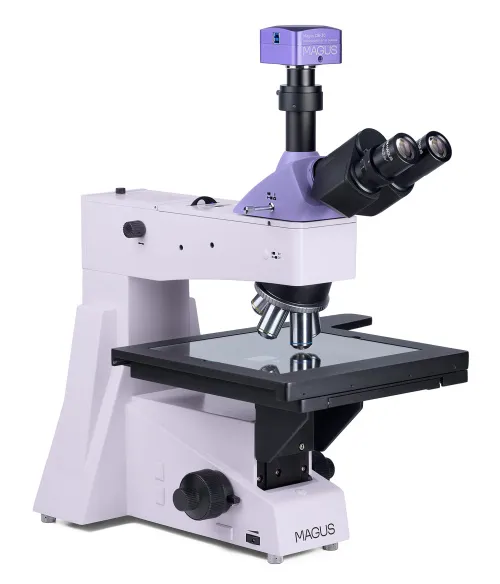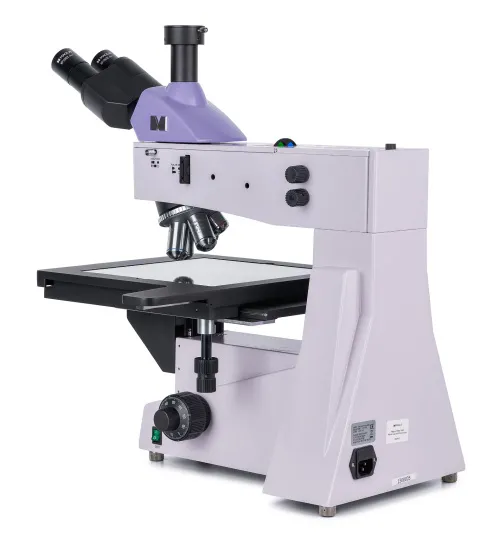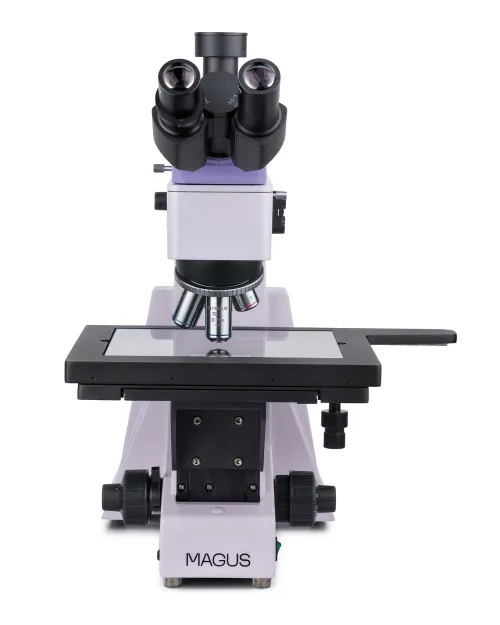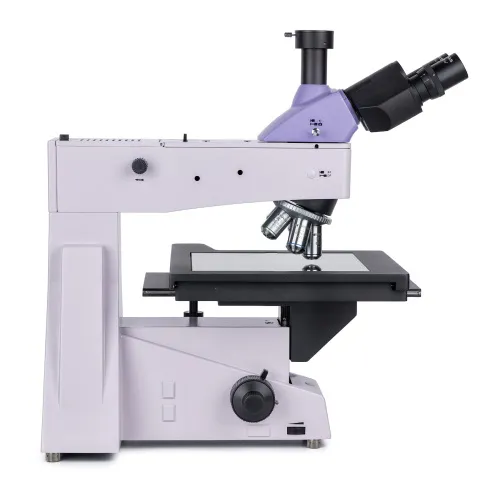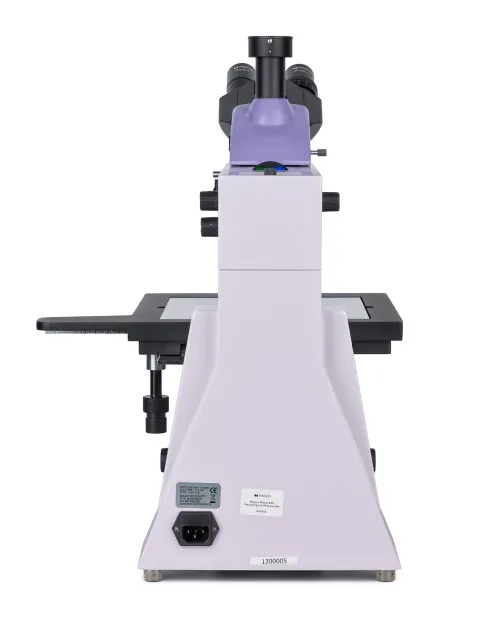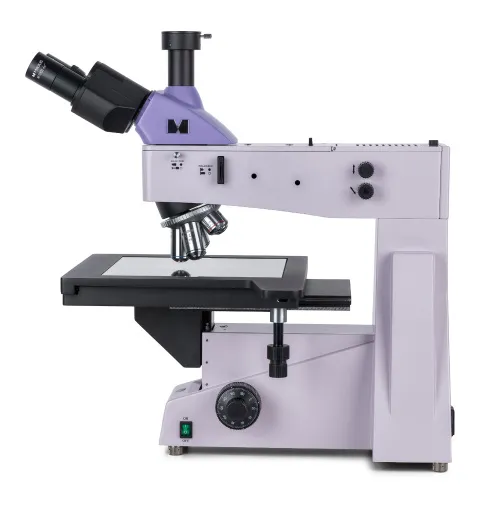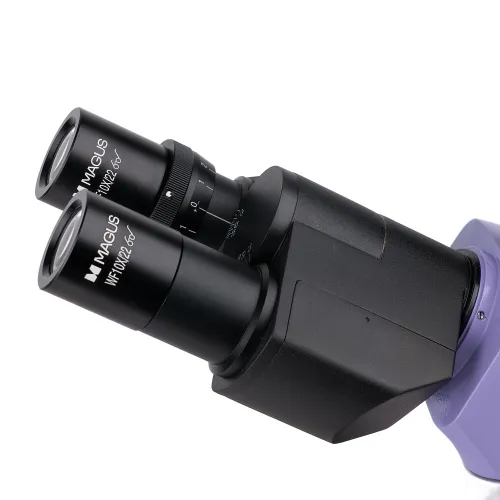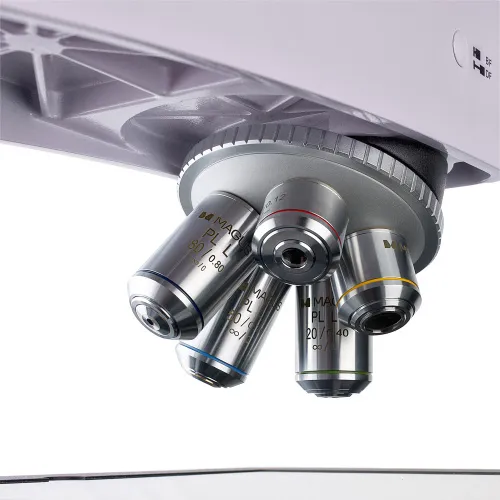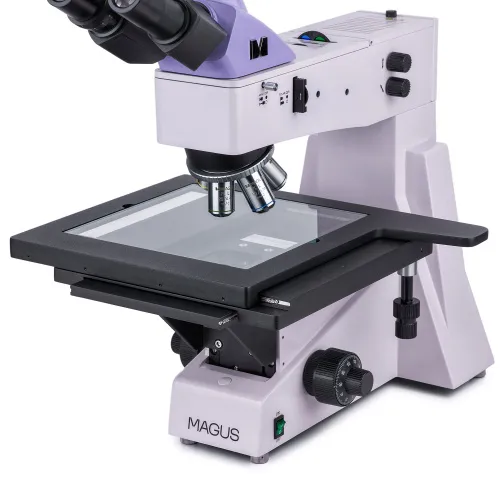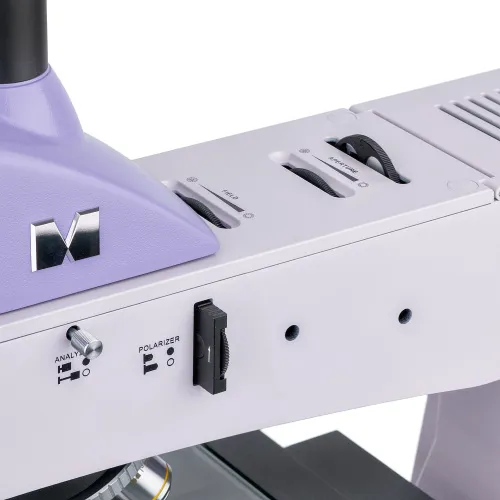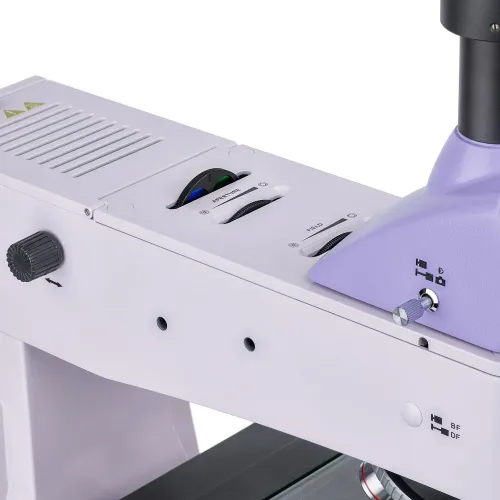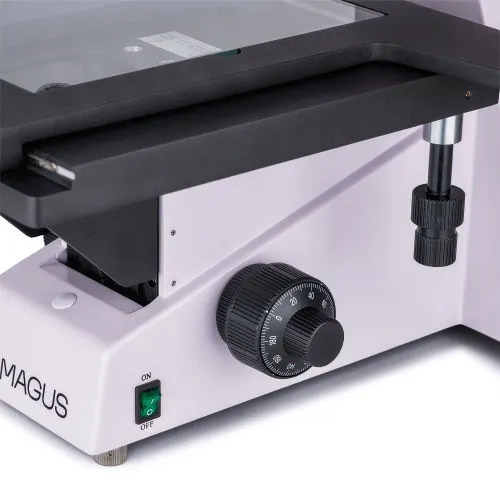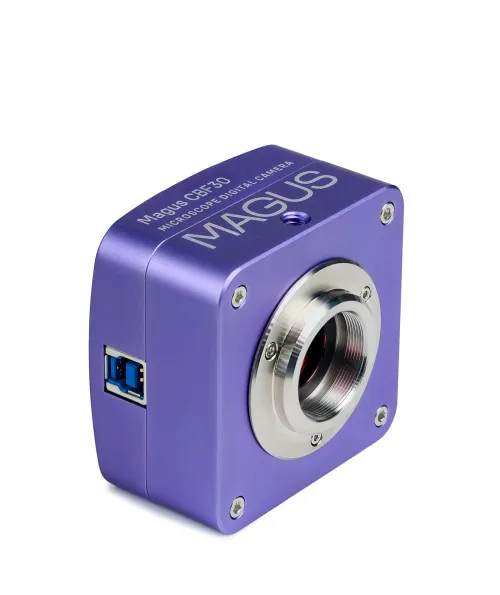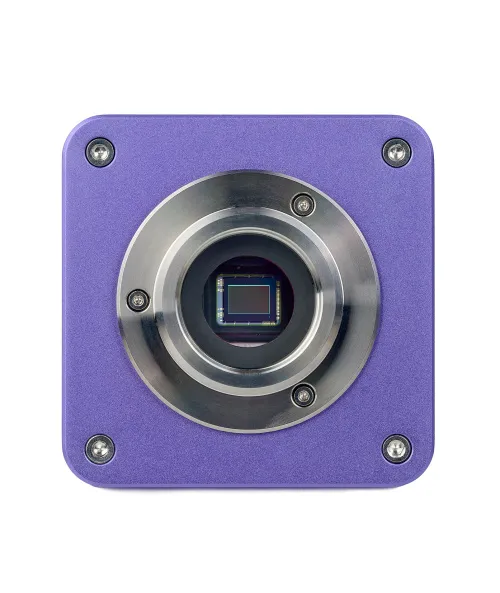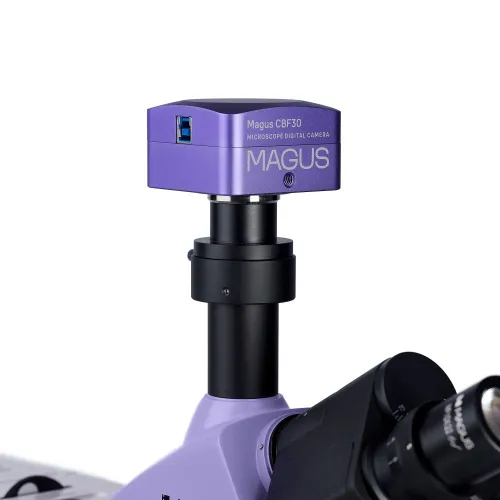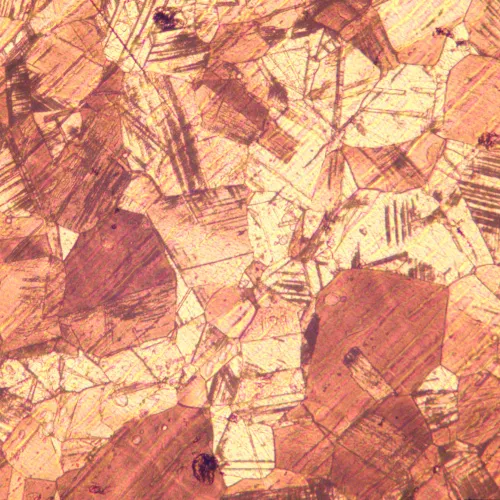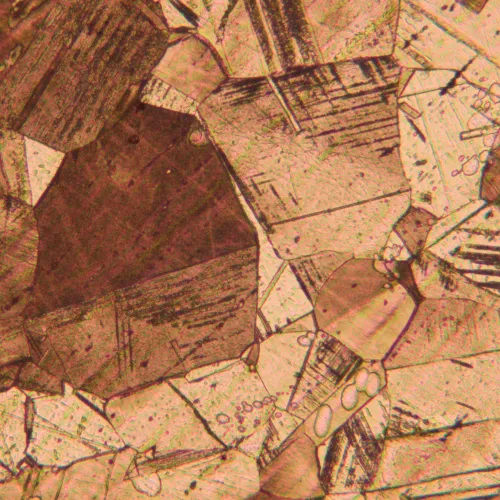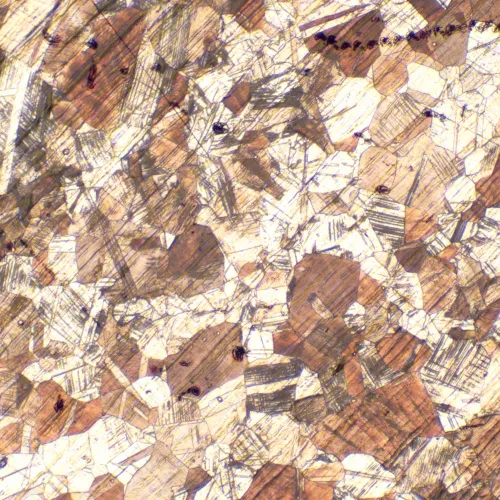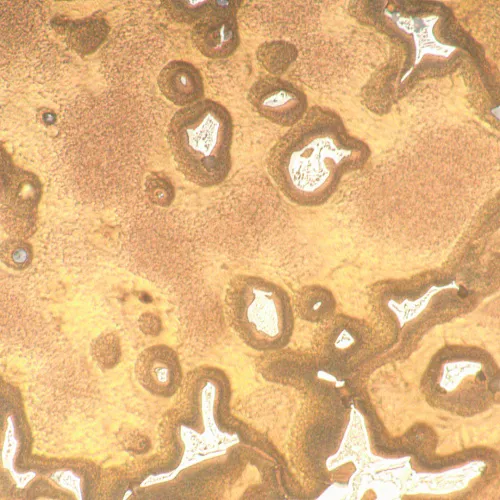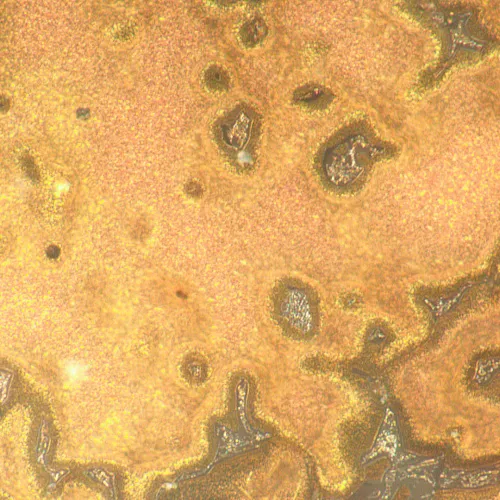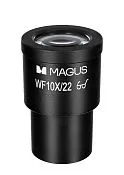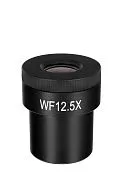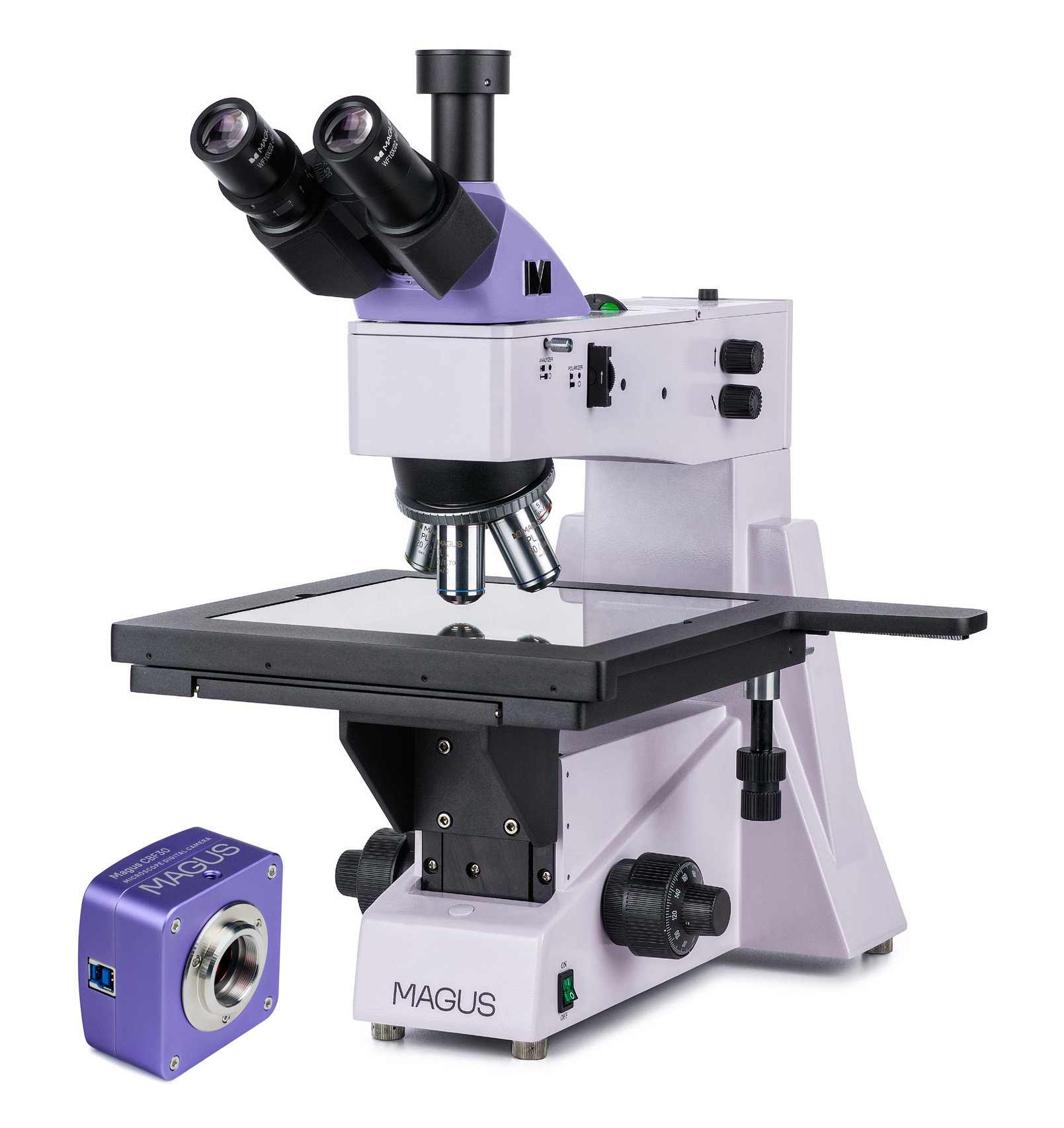MAGUS Metal D650 Metallurgical Digital Microscope
With a camera. Magnification: 50–800х. Trinocular head, plan achromatic objectives, 30W halogen reflected light illuminator, fine focusing scale value 0.7µm, large stage
| Product ID | 83032 |
| Brand | MAGUS |
| Warranty | 5 years |
| EAN | 5905555018393 |
| Package size (LxWxH) | 58x49x60 cm |
| Shipping Weight | 21.6 kg |
The MAGUS Metal 650 Metallurgical Microscope has a large stage where you can place photomasks, printed circuit boards, integrated circuits, and other long and wide specimens to be examined in reflected light. Brightfield and polarized light observations are possible. The microscope provides high precision focusing. The fine focusing scale value of 0.7µm makes it easy to work at high magnifications. It is used for conducting research in industrial plants and teaching engineering students.
Digital Camera
The MAGUS CBF30 Digital Camera enables you to take photographs and shoot video through a microscope, edit the resulting files, organize presentations, and make linear and angular measurements of objects (after correct calibration).
The device is designed to work on microscopes using the brightfield method and 4x, 10x, 20x, and 40x objectives.
The 6.3MP sensor enables you to shoot bright and detailed photos and videos at a maximum resolution of 3072x2048px. If necessary, the resolution can be lowered to 1536x1024px. However, this will not affect the frame rate, which will remain at 59fps, thereby ensuring smooth frame transitions without jerkiness or delays.
The SONY Exmor backlit color CMOS sensor enables you to use the camera even in low-light conditions. The image will remain readable and bright. Using an adapter with a magnification from 0.5x to 0.75x will provide the clearest possible image without distortion.
Optics
Infinity plan achromatic optics deliver sharp well-detailed images. The microscope head is trinocular, 30° inclined, and a trinocular tube for mounting a digital camera. The camera (not included) captures the photos and videos of the study and outputs the microscope image to an external screen. There is a two-position-beamsplitter: 100:0 and 0:100. The light beam is directed into the eyepieces or to the camera. There is a diopter adjustment ring on the left tube.
You can install 5 objectives in the revolving nosepiece – all of them are included in the package. To achieve higher magnification, you can install optional objectives instead of the basic ones. In the basic configuration, the microscope provides magnification in a range of 50 to 800x. The revolving nosepiece with objectives is oriented toward the interior – the user can see the objective inserted into the optical path.
Illumination
The reflected light illumination system combines three centering elements: light source, aperture, and field diaphragm. The 30W halogen illuminator emits warm light, and so working with the microscope for long periods of time does not make your eyes fatigue. The brightness of the illumination is adjustable, it is possible to set the Köhler illumination. The reflected light illumination system also comes with a polarization device: a built-in analyzer and a detachable rotating polarizer. There is a set of color filters.
Stage and focusing mechanism
The most interesting part of the microscope design is the 280x270 mm stage, which can be moved along two axes within 204mm. Therefore, you can observe large-sized samples and examine their surface easily. The coarse and fine focusing knobs are coaxial located on both sides of the microscope, with a lock knob and coarse tension adjustment knob. The handles are located close to the microscope base, you can place your hands freely on the table and take a comfortable position while observing.
Accessories
The MAGUS Metal 650 line of microscope-compatible accessories includes eyepieces, long working distance objectives, digital cameras, and calibration slides. The accessories can be used to expand the capabilities of the microscope.
Key features of the microscope:
- Large stage with a wide movement range for working with long and wide samples
- Fine focusing scale value 0.7µm for easy focusing at high magnifications; coarse focusing with a lock knob and tension adjustment
- Trinocular head with a trinocular tube and a beam splitter
- Reflected light illuminator: powerful 30W halogen bulb with brightness adjustment, and powered by AC power supply
- Polarization device, elements of the reflected light illuminator that can be centered, Köhler illumination, color filters
- Wide range of compatible optional accessories
Key features of the camera:
- Recommended for use with low magnification objectives
- Color light-sensitive sensor for clear images even in low light conditions
- Frame rate of 59fps, which is enough for the observation of moving objects or fast-moving processes
- The kit includes software that fully ensures the functionality of all the camera features and, consequently, a “quick start”
- Reliable USB3.0 interface for high data transfer speeds
- Resolution adjustment so that you can choose the option that suits you the best at any given moment
The kit includes:
- MAGUS CBF30 Digital Camera (digital camera, USB cable, installation CD with drivers and software, user manual and warranty card)
- Base with a power input, reflected light source, focusing mechanism, stage, and revolving nosepiece
- Trinocular head
- Infinity plan achromatic objective: PL L5x/0.12 WD 26.1mm
- Infinity plan achromatic objective: PL L10х/0.25 WD 20.2mm
- Infinity plan achromatic objective: PL L20х/0.40 WD 8.80mm
- Infinity plan achromatic objective: PL L50х/0.70 WD 3.68mm
- Infinity plan achromatic objective: PL L80x/0.80 WD 1.25mm
- Eyepiece 10x/22mm with long eye relief (2 pcs.)
- C-mount adapter 1x
- Hex key wrench
- AC power cord
- Dust cover
- User manual and warranty card
Available on request:
- 10x/22mm eyepiece with a scale
- 12.5x/14mm eyepiece (2 pcs.)
- 15x/15mm eyepiece (2 pcs.)
- 20x/12mm eyepiece (2 pcs.)
- 25x/9mm eyepiece (2 pcs.)
- Infinity plan achromatic objective: PL L40х/0.60 WD 3.98mm
- Infinity plan achromatic objective: PL L60x/0.70 WD 2.08mm
- Infinity plan achromatic objective: PL L100x/0.85 (dry) WD 0.40mm
- Calibration slide
| Product ID | 83032 |
| Brand | MAGUS |
| Warranty | 5 years |
| EAN | 5905555018393 |
| Package size (LxWxH) | 58x49x60 cm |
| Shipping Weight | 21.6 kg |
| Type | light/optical, digital, metallurgical |
| Microscope head type | trinocular |
| Head | Siedentopf |
| Head inclination angle | 30 ° |
| Magnification, x | 50 — 800 |
| Magnification, x (optional) | 50–1000/1250/1500/2000/2500 |
| Eyepiece tube diameter, mm | 30 |
| Eyepieces | 10х/22mm, eye relief: 10mm (*optional: 10x/22mm with scale, 12.5x/14; 15x/15; 20x/12; 25x/9) |
| Objectives | infinity plan achromatic: PL L5x/0.12, PL L10x/0.25, PL L20x/0.40, PL L50x/0.70, PL L80x/0.80; parfocal distance 45mm (*option: PL L40x/0.60, PL L60x/0.70, PL L100x/0.85 (dry)) |
| Revolving nosepiece | for 5 objectives |
| Working distance, mm | 26.1 (5x); 20.2 (10x); 3.98 (40x); 2.08 (60x); 8.80 (20x); 3.68 (50x); 1.25 (80x); 0.40 (100x) |
| Interpupillary distance, mm | 48 — 75 |
| Stage, mm | 280x270 |
| Stage moving range, mm | 204/204 |
| Stage features | two-axis mechanical |
| Eyepiece diopter adjustment, diopters | ±5 (on the left tube) |
| Diaphragm | built-in aperture and field |
| Focus | coaxial, coarse focusing (30mm, 13.1mm/circle, with a lock knob and tension adjusting knob) and fine focusing (0.0007mm) |
| Body | solid aluminum |
| Illumination | halogen |
| Brightness adjustment | ✓ |
| Power supply | 220±22V, 50Hz, AC network |
| Light source type | 12V/30W |
| Light filters | green, blue, yellow, matt |
| Operating temperature range, °C | 5...+35 |
| Additional | built-in analyzer and removable polarizer |
| User level | experienced users, professionals |
| Assembly and installation difficulty level | complicated |
| Application | metallurgical |
| Illumination location | upper |
| Research method | bright field, polarization |
| Pouch/case/bag in set | dust cover |
| Sensor | SONY Exmor CMOS |
| Color/monochrome | color |
| Megapixels | 6.3 |
| Maximum resolution, pix | 3072x2048 |
| Sensor size | 1/1.8" (7.37x4.92mm) |
| Pixel size, μm | 2.4x2.4 |
| Light sensitivity | 425mV at 1/30s |
| Signal/noise ratio | 0.15mV at 1/30s |
| Exposure time | 0.02ms–15s |
| Video recording | ✓ |
| Video recording | yes |
| Frame rate, fps at resolution | 59@1536x1024, 59@3072x2048 |
| Place of installation | trinocular tube, eyepiece tube instead of an eyepiece |
| Image format | *.jpg, *.bmp, *.png, *.tif |
| Video format | output: *.wmv, *.avi, *.h264 (Windows 8 and later), *h265 (Windows 10 and later) |
| Spectral range, nm | 380–650 (built-in IR filter) |
| Shutter type | ERS (electronic rolling shutter) |
| White balance | automatic, manual |
| Exposure control | automatic, manual |
| Software features | brightness, exposure time, image size |
| Software | MAGUS View |
| Output | 5Gb/s, USB 3.0 |
| System requirements | Windows 8/10/11 (32bit and 64bit), Mac OS X, Linux, up to 2.8GHz Intel Core 2 or higher, minimum 2GB RAM, USB 3.0 port, CD-ROM, 17" or larger display |
| Mount type | C-mount |
| Camera power supply | DC, 5V, from computer USB port; a 12V, 3A adapter for Peltier element |
| Camera operating temperature range, °С | -10...+50 |
| Operating humidity range, % | 30 — 80 |
and downloads
We have gathered answers to the most frequently asked questions to help you sort things out
Find out why studying eyes under a microscope is entertaining; how insects’ and arachnids’ eyes differ and what the best way is to observe such an interesting specimen
Read this review to learn how to observe human hair, what different hair looks like under a microscope and what magnification is required for observations
Learn what a numerical aperture is and how to choose a suitable objective lens for your microscope here
Learn what a spider looks like under microscope, when the best time is to take photos of it, how to study it properly at magnification and more interesting facts about observing insects and arachnids
This review for beginner explorers of the micro world introduces you to the optical, illuminating and mechanical parts of a microscope and their functions
Short article about Paramecium caudatum - a microorganism that is interesting to observe through any microscope

